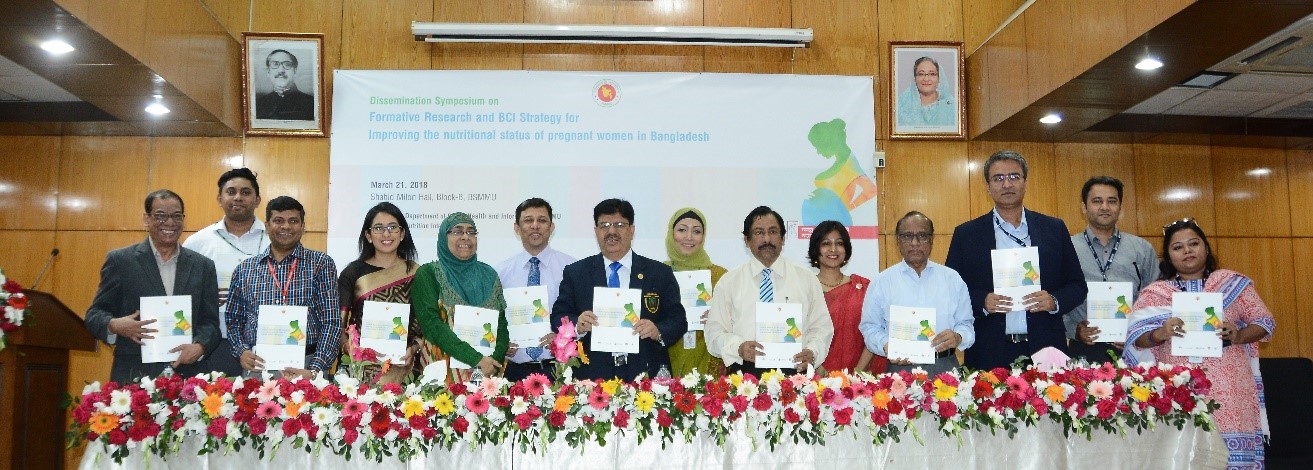Field Stories
Women at the heart of pregnancy care in Ethiopia
January 30, 2025
WP_Term Object
(
[term_id] => 118
[name] => Events
[slug] => events
[term_group] => 0
[term_taxonomy_id] => 118
[taxonomy] => news-category
[description] =>
[parent] => 0
[count] => 60
[filter] => raw
)
Nutrition International launches behaviour change intervention strategy to improve health of pregnant women in Bangladesh
NI, in collaboration with Bangabandhu Sheikh Mujib Medical University, has recently launched a new BCI Strategy to change attitudes and behaviours around nutrition amongst mothers-to-be, pregnant mothers, and their family.
Posted on October 3, 2018


Dhaka, BANGLADESH ― While Bangladesh has made great strides in improving maternal and child health, many common misconceptions still create barriers that stop women and their families from making better health and nutrition-related decisions, with potential dire consequences for pregnant mothers.
To address this issue, Nutrition International, in collaboration with Bangabandhu Sheikh Mujib Medical University, has recently launched a new Behaviour Change Intervention (BCI) Strategy to change attitudes and behaviours around nutrition amongst mothers-to-be, pregnant mothers, their husbands and members of their family, with the goal of improving the nutritional status of pregnant women in the country.
The Strategy includes a campaign with tools and key messages designed to provide essential nutrition information to pregnant women and members of their family as a way to raise their awareness on the importance of good nutrition, provide essential nutrition information and to encourage them to take action.
Aiming to educate pregnant women and their families on topics such as recommended health care during pregnancy, increased nutritional requirements and good nutrition, the Strategy and its campaign are based on an extensive formative research conducted in multiple districts to understand the barriers to nutrition along with the prevalent knowledge, beliefs and practices during pregnancy.
The campaign is being implemented across 14 districts and two city corporations to improve nutrition for 600,000 pregnant women as part of Nutrition International’s Right Start Initiative, funded by the Government of Canada. Combined with other interventions a total of 2.6 million women and girls in Bangladesh will benefit from Right Start by 2020.
Communications and knowledge tools developed for this campaign were designed to be easily accessible and highly visible to the target audience and will complement awareness efforts made through nutrition counselling offered by health providers. Those include desk calendars and posters to be displayed at health centres, grocery stores and at home, and a set of key messages for health providers to deliver during counselling sessions.
As part of the campaign, some of the actions recommended for pregnant women include at least four antenatal checks during pregnancy at a health centre, the consumption of daily iron and folic acid tablets to reduce anaemia, early initiation to breastfeeding, exclusive breastfeeding for the first six months of the newborn’s life and the adoption of good nutrition habits.
In Bangladesh, 42.4 per cent of women of reproductive age suffer from anaemia. In addition, only one-third, or 31 per cent of pregnant women receive the four antenatal check-ups needed to comprehensively monitor their pregnancy. On the other hand, the initiation of early breastfeeding is around 51 per cent and only 55 per cent of babies are exclusively breastfed for the first six months.
“We want to offer women and their families better knowledge and information on good nutrition with hope to shift their behaviour around nutrition during pregnancy. We believe this strategy has the potential to be scaled up nationally to benefit all pregnant women and their newborns,” said Zaki Hasan, Country Director, Nutrition International Bangladesh.
Nutrition International has partnered with the Institute of Public Health Nutrition under the Government of Bangladesh’s Ministry of Health and Family Welfare for the effective implementation and use of the BCI strategy, campaign and tools.